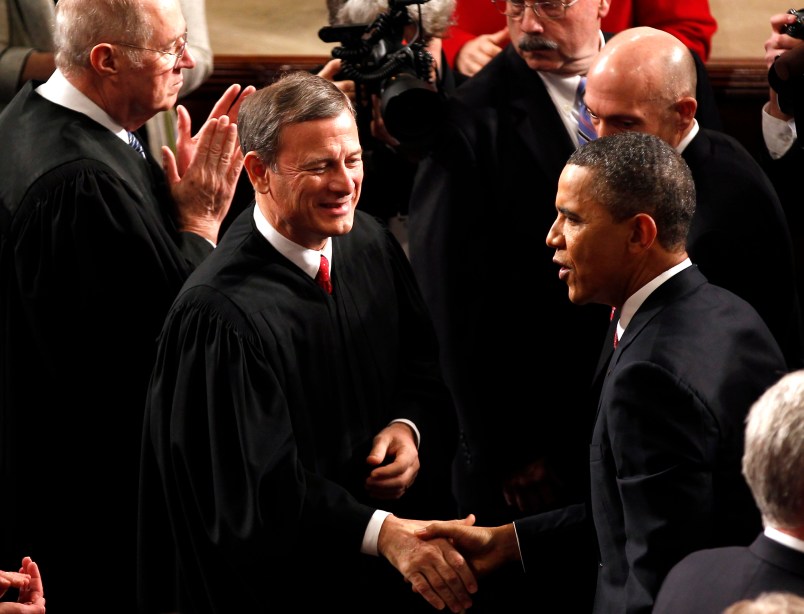The Supreme Court on Thursday curtailed the president’s power to temporarily appoint individuals to government posts, delivering a blow to President Barack Obama and altering the balance of power between the executive and legislative branches.
Justice Stephen Breyer wrote the opinion for the Court.
The justices held that the Constitution does not permit the president to appointment people to government positions without Senate approval when the chamber is in a pro forma session — when it gavels in and out once every three days to fulfill a constitutional requirement but does not conduct business.
“For purposes of the Recess Appointments Clause, the Senate is in session when it says that it is, provided that, under its own rules, it retains the capacity to transact Senate business,” Breyer wrote, observing that the Senate does not define pro forma as a recess. “[W]e conclude that we must give great weight to the Senate’s own determination of when it is and when it is not in session. But our deference to the Senate cannot be absolute.”
The majority opinion was joined by Justices Anthony Kennedy, Ruth Bader Ginsburg, Sonia Sotomayor and Elena Kagan. The ruling was relatively narrow and could have been much worse for the Obama administration. The other four justices wanted to go further in curtailing the recess appointment power.
Justice Antonin Scalia, joined by Chief Justice John Roberts and Justices Antonin Scalia and Clarence Thomas, wrote a separate opinion agreeing with the outcome but saying they’d further restrict the president’s authority to filling vacancies that arise only during the recess in question. (The majority ruling allows the president to fill slots during a recess regardless of when they were vacated.)
“The real tragedy of today’s decision is not simply the abolition of the Constitution’s limits on the recess appointment power and the substitution of a novel frame work invented by this Court,” Scalia wrote. “It is the damage done to our separation-of-powers jurisprudence more generally.”
Recess appointments, used by many past presidents, became controversial after Obama began to use them more frequently to appoint nominees to federal agencies like the Center for Medicare & Medicaid Services and the National Labor Relations Board when they were bottled up by Senate Republicans. His use of the tactic has diminished since the Democratic majority eliminated the 60-vote threshold in November for most presidential nominees.
The recess appointment power flows from Article II, Section 2 of the Constitution, which says: “The President shall have power to fill up all vacancies that may happen during the recess of the Senate, by granting commissions which shall expire at the end of their next session.”
The Supreme Court’s ruling could have significant consequences for the Obama administration if Republicans reclaim the Senate majority next year. Donald Verrilli, the U.S. solicitor general, had argued that the tool was a “safety valve” for the executive branch to confirm leaders to implement the law when the Senate won’t act.
The case was brought by Noel Canning, a business based in Washington State, which alleged that that actions taken against it by the National Labor Relations Board were invalid as they relied on the decisions of recess appointees to the board who were put in place during pro forma sessions.
This is a breaking story and this article will be updated. The ruling is available below.







The Senate rules need to be changed. Recess appointments is a power granted to the POTUS in the constitution. Perpetual pro forma sessions need to be eliminated.
What a lot of nonsense. Time to change both the Senate rules and get rid of the filibuster altogether.
curtails–doubtful
This is a narrow ruling. It gives the President substantial recess appointment power. It says the only problem with the appointments was that the President had to respect the Senate’s pro forma recesses.
I will remind the Baggernuts… Obama will be gone in 2017 and I think y’all will run a realistic candidate again at some point (no rush though)… SCOTUS might do well to remember that. Petards and all that, you know.
Well yes, but there’s absolutely nothing to prevent a hostile (read: Republican) Senate having nothing but pro forma recesses. It makes it possible for the Senate to nullify one clause of the Constitution without amending it. Not good.